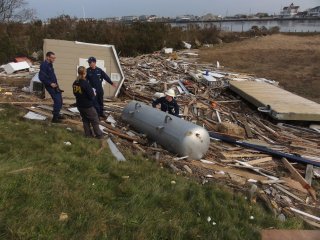Engagement Opportunities
A key element of EPA's Homeland Security Research Program is ensuring that research conducted by the program is meeting the needs of its partners and stakeholders. To do this, researchers may at times seek out volunteers to participate in their research studies.
Below is information on current studies seeking volunteers, along with points of contact for any questions or to get involved the study.
Disaster Waste Management Study

Posted 12/2/2021
EPA has an opportunity for state and local professionals involved with disasters in different capacities to share their experiences and the needs of their community regarding on-the-ground disaster waste decision-making. Interested planners and responders can provide critical insights to this project while they learn from other waste and emergency management professionals.
Why is this Study Being Conducted?
Disaster waste management places significant logistical, emotional, and financial burdens on communities, which can increase the time necessary to recover. Each step of disaster waste management (e.g., waste sorting, staging, transport, treatment, disposal) involves decisions made by different individuals, organizations, and government agencies. For example, families decide what to throw away while cleaning out their homes; municipalities prioritize sites for waste clearing and staging; waste haulers negotiate damaged infrastructure to transport waste. These decisions often run into social barriers, miscommunication, and conflicts that slow community recovery. The social interactions underpinning these decisions are not well understood but are critical for disaster waste management processes to improve.
Researchers are looking to understand what social conflicts may occur in the decision-making process during and after a disaster. Specifically, they want to understand how debris and waste are sorted, staged, and transported in disaster contexts, as well as how final disposal and/or recycling decisions are made in the field.
Researchers are interested in learning more about who is involved in these processes and how coordination between agencies and organizations occurs in different types of disasters. Understanding this social context can also help address environmental injustices as they pertain to waste staging.
What is the expected outcome of this study?
This study would bring together state and local emergency management, waste management professionals, and others involved with disasters from across the country to discuss with and learn from one another about waste and debris management. Local and state responders have responded to unique conditions of each disaster and worked towards tailored solutions to meet waste management needs. Researchers want to hear about these experiences in order to compile them as a resource for other emergence response and waste management professionals.
This study will help inform the development of resources at the federal level that can contribute to capacity-building for improved future disaster waste management, and improvement in coordination among federal, Tribal, state, and local efforts.
How will this study be conducted?
Volunteers can choose to participate in either a 90-minute virtual focus group with other emergency response staff or a 60-minute virtual one-on-one interview with the researchers. Focus groups will be pulled together to discuss their experiences generally. Researchers will facilitate discussion among professionals and to gather information on specific disaster and stream cases.
Focus groups and interviews are being scheduled throughout the Winter 2021 and Spring 2022. Please contact researchers if you are interested in participating – they can work with your schedule.
Who should get involved?
Researchers would like to hear about experiences with on-the-ground decision-making regarding disaster-related debris/waste (including preparedness or recovery) in various disasters (e.g., tornadoes, floods, wildfires, oil spills, etc.) and types of waste (including hazardous household waste, vegetative debris, construction waste, animal carcasses, etc.). Emergency and waste management personnel, as well as others involved with disasters, who are interested in participating in this research should contact Keely Maxwell ([email protected]) or Marissa Matsler ([email protected]) with any questions or to suggest participants for this study.
